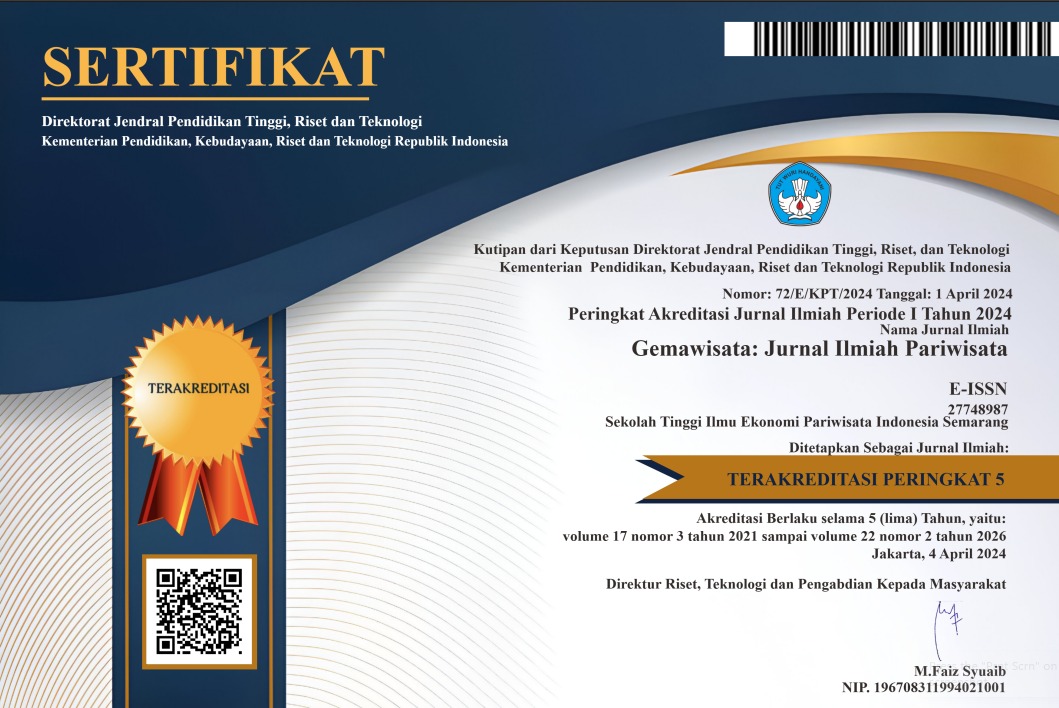Partisipasi Masyarakat dalam Pengembangan Konsep Edu-Tourism Melalui TPS 3R KSM Nangun Resik Desa Paksebali
DOI:
https://doi.org/10.56910/gemawisata.v21i2.692Keywords:
edu tourism, community participation, tourism village, TPS 3R Nangun Resik, PaksebaliAbstract
This study examines the form of community participation in the development of the edu tourism concept through TPS 3R KSM Nangun Resik in Paksebali Village, Klungkung. The issue of waste management is a major challenge in sustainable development, especially for areas that experience a shift in function from agrarian areas to tourism areas. Paksebali Village through TPS 3R Nangun Resik not only makes TPS 3R Nangun Resik a place for waste processing but also directed as a vehicle for environmental education, which has the potential to be developed in the concept of edu tourism. In the context of waste management, edu tourism can be a strategic tool to increase public awareness and participation in the importance of sustainable environmental management. This research uses a qualitative approach in describing and explaining the form of community participation in the development of the edu tourism concept through TPS 3R Nangun Resik Paksebali Village. The form of community participation in the development of the concept of edu tourism through TPS 3R Nangun Resik Paksebali Village is divided into 3 (three) forms of participation, namely (1) Participation in community planning is involved in efforts to make TPS 3R Nangun Resik as a means of educational tourism at the initiation of the Head of Paksebali village; (2) Participation in implementation in addition to being an active employee, one of the main forms of involvement that can be seen is as an educational tour guide. People who act as guides are given special training so that they are able to deliver educational material in a communicative way and in accordance with the local context; (3) Participation in monitoring the role of the community does not stop at the planning and implementation stages, the community is also involved in the process of periodic monitoring and evaluation of edu tourism activities. Furthermore, it is recommended to continue providing training related to tourism both to the community directly involved in the development and management of edu tourism at TPS 3R Nangun Resik.
References
Bodger, D. (1998). Leisure, learning, and travel. Journal of Physical Education, Recreation & Dance, 69(4), 28–31.
Creswell, J. W., & Creswell, J. D. (2017). Research design: Qualitative, quantitative, and mixed methods approaches. Sage publications.
Fauzi, L., Dewi, L., & Hadiapurwa, A. (2016). Implementasi Program Edu-tourism di Perpustakaan Museum Asia Afrika. Edulib, 6(1).
Kurniawati, E., Hamid, D., & Hakim, L. (2018). Peran Masyarakat Dalam Perencanaan Dan Pengembangan Desa Wisata Tulungrejo Kecamatan Bumiaji Kota Batu. Jurnal Administrasi Bisnis (JAB), 54(1), 8–14.
Malihah, E., & Setiyorini, H. P. D. (2014). Tourism education and edu-tourism development: Sustainable tourism development perspective in education. The 1st International Seminar on Tourism (ISOT)-“Eco-Resort and Destination Sustainability: Planning, Impact, and Development, 1–7.
Nassaji, H. (2015). Qualitative and descriptive research: Data type versus data analysis. In Language teaching research (Vol. 19, Issue 2, pp. 129–132). Sage Publications Sage UK: London, England.
Pitana, I. G. (1999). Community Management dalam Pembangunan Pariwisata. Majalah Ilmiah Pariwisata-Analisis Pariwisata PS Pariwisata Universitas Udayana, 2(2), 75–77.
Pusparini, G., Fathoni, T., & Rullyana, G. (2018). Program Pelestarian Budaya Edutourism pada Taman Baca Masyarakat Eco Bambu Cipaku. Edulibinfo, 5(2).
Ritchie, B. W. (2003). Managing educational tourism (Vol. 10). Channel View Publications.
Sharma, D. A. (2015). Educational Tourism: Strategy for Sustainable Tourism Development with reference of Hadauti and Shekhawati Regions of Rajasthan, India. Journal of Business Economics and Information Technology, 2, 1–12.
Sugiyono, D. (2013). Metode penelitian pendidikan pendekatan kuantitatif, kualitatif dan R&D.
Sunaryo, B. (2013). Kebijakan pembangunan destinasi pariwisata: konsep dan aplikasinya di Indonesia. Gava Media.
Wardiyanto. (2011). Perencanaan pengembangan pariwisata. Lubuk Agung. https://books.google.co.id/books?id=YFt6MwEACAAJ
Wijana, P. A. (2019). Analisis Bentuk Partisipasi Masyarakat Dalam Pengelolaan Pura Puseh Dan Pura Desa Di Desa Batuan Sebagai Daya Tarik Wisata Di Kabupaten Gianyar, Bali. Journey: Journal of Tourismpreneurship, Culinary, Hospitality, Convention and Event Management, 2(1), 19–34.
Yfantidou, G., & Goulimaris, D. (2018). The exploitation of edutourism in educational society: A learning experience necessity through physical activity and recreation. Sport Science, 11(1), 8–15.


1_(1).jpg)






